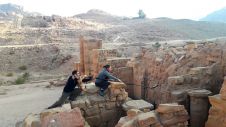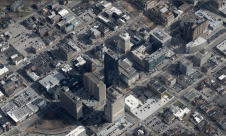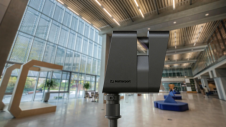UN/USA International Meeting on GNSS
This report covers the latest in a series of meetings on the use and applications of Global Navigation Satellite Systems (GNSS) hosted by the United Nations Office for Outer Space Affairs (UN OOSA) and supported by the US State Department. The meeting was held in Vienna, Austria, from 13th to 17th December 2004.
The series to which it belongs arose from recommendations of the UN Committee on the Peaceful Use of Outer Space (COPUOS) as ratified by the UN General Assembly of the UN and involved key players delivering GNSS components including:
- USA’s Global Positioning System (GPS), represented by the State Department, Department of Transport and Interagency GPS Executive Board
- Russia’s GLONASS, represented by the Satellite Navigation Department of the Federal Space Agency
- Europe’s planned Galileo system, represented by the European Commission (EC) and European Space Agency (ESA).
One feature of the meetings has been a strong focus on improving infrastructure and capacity building for GNSS use in developing countries and countries in transition. The global user community was also represented, major players in the many application areas attending including key organisations for the surveying and mapping community: the International Association of Geodesy (IAG), the IAG’s International GPS Service (IGS), the International Cartographic Association (ICA) and the International Federation of Surveyors (FIG).
FIG and UN OOSA
There was a brief ceremony on the first day for the signing of a Memorandum of Understanding (MoU) by UN OOSA director Sergio Camacho and FIG president Holger Magel. Later in the week a follow-up meeting took place at working-officer level to explore concrete areas of co-operation between UN OOSA and FIG. In line with the MoU, three main topics were discussed. These were Space Science and Technology education in general, the specifics of GNSS education, and Space Technology for Disaster Management. There is an existing set of curricula for the Regional Centres for Space Science and Technology Education in four topics: satellite communications, satellite meteorology and global climate, space and atmospheric science and remote sensing and the geographic information systems. It was decided to form a sub-group to investigate the development of a new curriculum on GNSS. It was also decided that the sub-group review GNSS content of the existing four curricula. The group will be co-chaired by Naser El-Sheimy (for FIG) and Prof Lo-Presti from Italy. There was discussion on Space Technology for Disaster Management; David Stevens from OOSA oversees this topic and will contact Theo Kotter to explore potential synergy between his work and the work of Theo’s FIG WG on Disaster Management.
Workshops and WGs
The objectives of this part of the meeting were to:
- review progress made in implementing recommendations of the International Workshop held in Vienna in December 2003
- review the status of follow-up projects and potential ways and means to carry them forward in 2005 and beyond
- review any follow-up initiatives and actions resulting from the series of UN/USA Regional Workshops on GNSS
- review specific recommendations of the Action Team on GNSS and possible ways and means of implementing these in 2005 and beyond.
There were many presentations on the latest status of GPS Modernisation, GLO-NASS revitalisation and developments in Galileo, the various augmentation systems around the world and key user-organisations. There were also many presentations on GNSS applications issues in developing countries. For FIG, one major issue emerging from the Workshops and Working Group is support for development of geodetic reference frames (especially in developing countries) that are compatible with GNSS. The major priority here is addressing African content through the existing IAG project known as AFREF.
Committee on GNSS
The third major aim of the week was to work towards final terms of reference for the establishment of an In-ternational Committee on GNSS (ICG), under the auspices of the UN. With GPS Modernisation, GLONASS revitalisation and Galileo all happening in the next five years, it is very important that FIG be strongly involved in decision-making processes concerning these systems; and the ICG is to become the forum for such discussions. This meeting saw key players from the Workshop (e.g. USA, Russia and the EU) offering their strong support for formation of the ICG and, importantly, there was also representation from the Space Agencies of China, India, Japan and Canada. The forming members of the ICG are invited to another meeting in Vienna in March 2005 to finalise its Terms of Reference. A detailed proposal on the official formation of the ICG can then go to the UN Committee on the Peaceful Use of Outer Space (COPUOS).

Value staying current with geomatics?
Stay on the map with our expertly curated newsletters.
We provide educational insights, industry updates, and inspiring stories to help you learn, grow, and reach your full potential in your field. Don't miss out - subscribe today and ensure you're always informed, educated, and inspired.
Choose your newsletter(s)
























